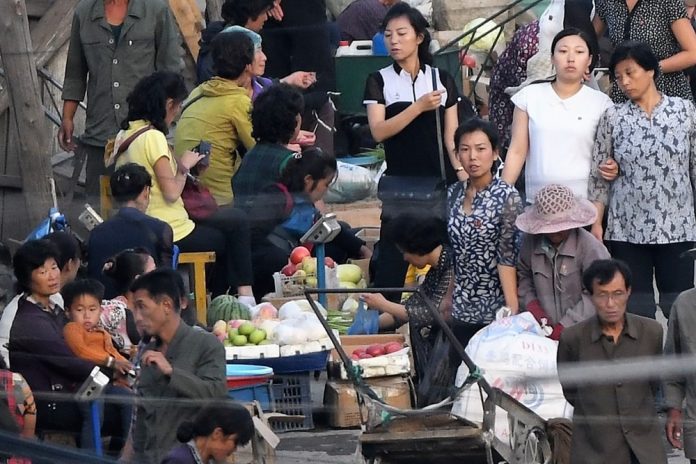 FILE PHOTO: North Koreans are seen peddling goods at a street market in Hyesan, Yanggang Province. (© Daily NK)
FILE PHOTO: North Koreans are seen peddling goods at a street market in Hyesan, Yanggang Province. (© Daily NK)
Tensions have grown between buyers and sellers in North Korea’s markets as more merchants falsify the weight of their goods.
“In Hamhung’s Sapo Market and other major markets in the city recently, more vegetable buyers are complaining that they’re getting less than what they paid for,” a Daily NK source in South Hamgyong province said recently. “This is happening because vegetable sellers routinely lie about the weight of their produce.”
According to the source, vegetable sellers in Hamhung’s markets often label their produce as 1 kilogram, but they’re actually selling only 700 or 800 grams.
As a result, shoppers frequently return with their vegetables in hand to argue or demand refunds because they received much less than the marked amount. This sometimes leads to shouting matches or even physical fights.
A Hamhung resident identified as Kim bought what was supposed to be a kilogram each of cucumbers and peppers from a market on July 12. When she got home, however, she discovered that the cucumbers were 200 grams light, while the peppers were 250 grams short.
Kim went back to the seller immediately and demanded a refund, but the merchant stubbornly refused, insisting that they had given her the measured amount and that vegetables naturally lose weight as moisture evaporates.
As Kim kept demanding her refund and the merchant kept refusing, their argument grew more heated, eventually turning into a physical fight. Only when nearby merchants and shoppers rushed over to break them up did they stop.
During the scuffle, though, the merchant’s vegetables scattered across the ground, creating a loss for the seller. In the end, Kim went home empty-handed.
Merchants struggle with razor-thin margins
“Merchants who deal in vegetables complain that they won’t make any money if they sell things by their actual weight,” the source explained. “Especially because vegetable weights drop rapidly in summer as moisture evaporates, merchants will take a loss if they sell produce at the proper weight.”
“When you subtract the various costs, including transportation and market taxes, practically no profit is left,” he said. “You often lose money if you sell exactly by the kilo, but if you raise prices, nobody wants to buy, putting sellers in a tough spot.”
In response, some sellers want to sell by the unit rather than by weight, the source added.
“In the markets, vegetables were always the item merchants most often skimped on, but recently, it’s gotten even worse,” the source said. “In the past, buyers used to overlook this, saying they understood, but with times getting harder, people often demand refunds nowadays even if what they bought is just 100 grams short.”
Previously, merchants would quickly make up any shortfalls if customers complained, but recently, they often refuse outright, arguing that they gave buyers the measured amount, which creates tensions with the public.
The same thing is happening elsewhere. “It’s unusual when a day passes without a fight at a vegetable stand,” a source in Ryanggang province said. “Sometimes, there are as many as four or five fights.”
“People buy vegetables without much suspicion because the merchants weigh the produce with electronic scales, but they often return to the market to protest after they get home and find that the actual weight was less,” the source said. “Vegetable sellers are having a harder time making money, so they reduce their losses by rigging the scales to display more than the actual weight.”
